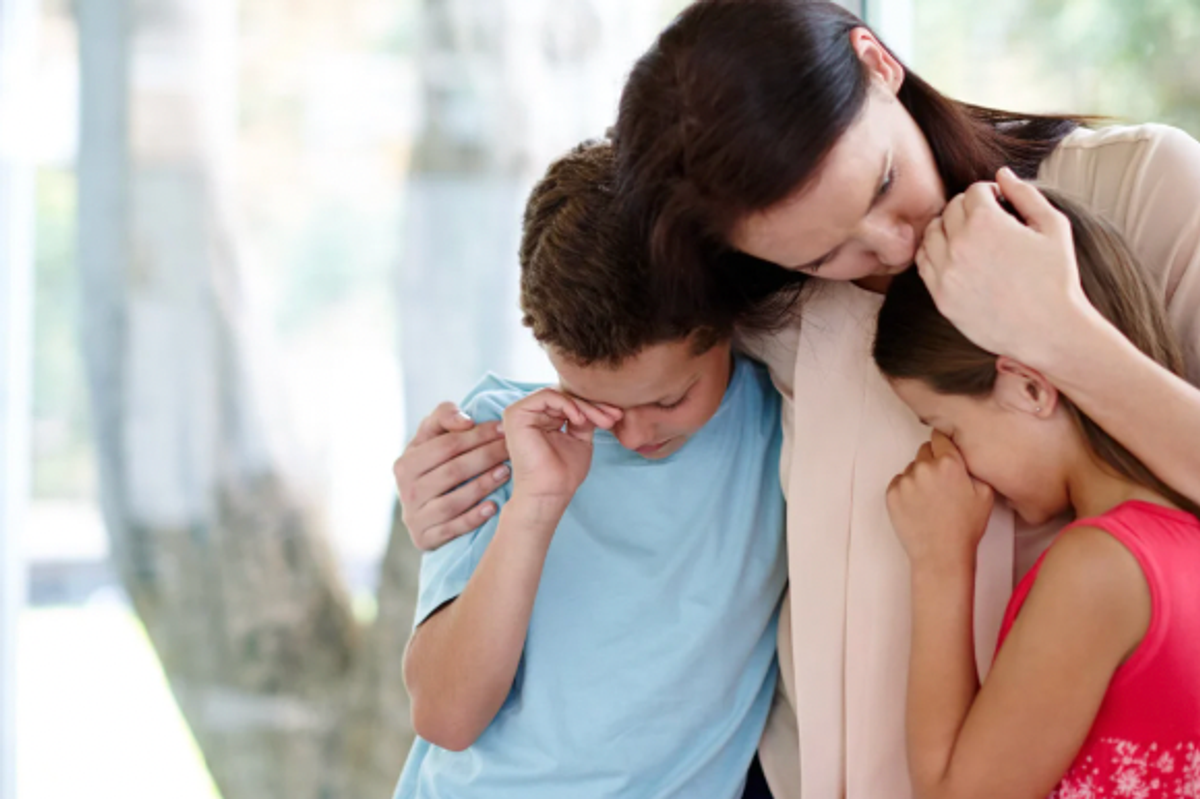Brain scans show that grandmas connect with their grandkids better than their own children
Was your mom hard on you, but spoils her grandkids? There's an evolutionary reason behind it.
A grandmother and grandchild share a special evolutionary bond.
It can be annoying, as a parent, when your own mom or dad who was super hard on you growing up, dotes and fawns all over their grandchildren. Something about becoming a grandparent turns even the hardest of souls into a big old softy. And, as rejected as it can sometimes make grown-ups feel, it turns out there might be a good reason for this phenomenon — especially in women. It's called the "grandmother effect."
For the past 55 years, scientists have theorized that a major reason why humans live so much longer past their reproductive years than other species is because of grandmothers. The "grandmother effect," as it's known, postulates that in hunter-gatherer societies, grandmothers played a vital role in finding food and raising children. In fact, the grandmother's role was so important that it had a huge impact on whether or not children survived.

"By relieving a mother of some of her child-raising responsibilities, so the thinking goes, grandmothers make it easier for their daughters to have more children and also make it possible for those children to have longer lives by helping them during the difficult early years of life," Haider J. Warraich writes in Stat. Two studies further this hypothesis by showing the important roles that grandmothers have in the survival of their grandchildren. A study of birth and death records in Finland for individuals born between 1731 and 1890 found that having a maternal grandmother between the ages of 50 and 75 increased a child's survival rate.
Another study found that proximity to grandmother matters, too. The shorter the distance between grandmother and grandchild, the more involved the grandmother can be and the more benefits that accrue to her daughter and grandchildren.
In others words, grandmothers in early societies weren't just laying around like Charlie Bucket's grannies in Charlie and the Chocolate Factory. They were actively involved in lightening the childcare load, which benefitted just about everyone in the family.
The grandmother effect could be a major reason why a new study shows that grandmothers may feel a closer emotional bond to their grandchildren than their own offspring.
A study by James Rilling of Emory University in Atlanta, Georgia published in "The Royal Society" measured brain function in 50 grandmothers with at least one biological grandchild between 3 and 12 years old.

Grandmothers were shown photos of their grandchild, an unknown child, an unknown adult and the same-sex parent of the grandchild. The study found that when a grandmother saw a photo of their grandchild it activated parts of their brain associated with emotional empathy and movement.
When the grandmothers saw a photo of their adult child, it activated areas of the brain associated with cognitive empathy. So, to put it simply, when shown the pictures, the grandmothers were attempting to emotionally empathize with their grandchildren while trying to cognitively understand what their adult children were thinking.
That emotional empathy is extremely powerful and visceral. Cognitive empathy is useful, but is one layer removed. You can logically understand what someone is thinking or feeling without actually feeling it yourself. Emotional empathy is much more involved and tangible.
"That suggests that grandmothers are geared toward feeling what their grandchildren are feeling when they interact with them," Rilling said in an Emory news article. "If their grandchild is smiling, they're feeling the child's joy. And if their grandchild is crying, they're feeling the child's pain and distress."
Given the importance of the grandmother effect, it's no surprise that our grandmothers seem to be hardwired to love us in the deepest way possible. Science shows that without this incredible bond, humans may not have made it this far. Conversely, it also shows that without having such an important role in their post-reproductive years, our grandparents may not have evolved to live so long.
- YouTube www.youtube.com
In the end, the relationship appears to be symbiotic. Grandmothers promote the survival of a child who one day may grow up to be a grandparent and live longer because they have such an important role in the life of their grandchild.
So if your mom was a tough cookie growing up but suddenly seems to be all sugar and gumdrops when the grandbabies are around, don't take it personally. It's embedded in her DNA to love and care for them. Without the responsibility of being the primary caregiver (who are usually just trying to survive the day to day), grandmothers are free to spoil, snuggle, and connect with their grandkids in a way sometimes they never could with their own children. It's a natural process, and ultimately a good thing. If you're lucky enough to have an involved grandma, the science says you should consider yourself lucky!
This article originally appeared four years ago. It has been updated.





 Want your house to be THE house for teens? These suggestions could help.
Want your house to be THE house for teens? These suggestions could help.  There's a difference between being "the cool house" and being "the house."
There's a difference between being "the cool house" and being "the house."  We all miss our teenage metabolism, don't we?
We all miss our teenage metabolism, don't we?  Judging technique can come later. Way later. For now, just let kids create. Photo by
Judging technique can come later. Way later. For now, just let kids create. Photo by  Schools Out Fun GIF by Pen Pals
Schools Out Fun GIF by Pen Pals  Class in session
Class in session  Season 3 Running GIF by The Simpsons
Season 3 Running GIF by The Simpsons  A
A  An empty room.Canva Photos.
An empty room.Canva Photos. An older couple packing up their home. Canva Photos.
An older couple packing up their home. Canva Photos.